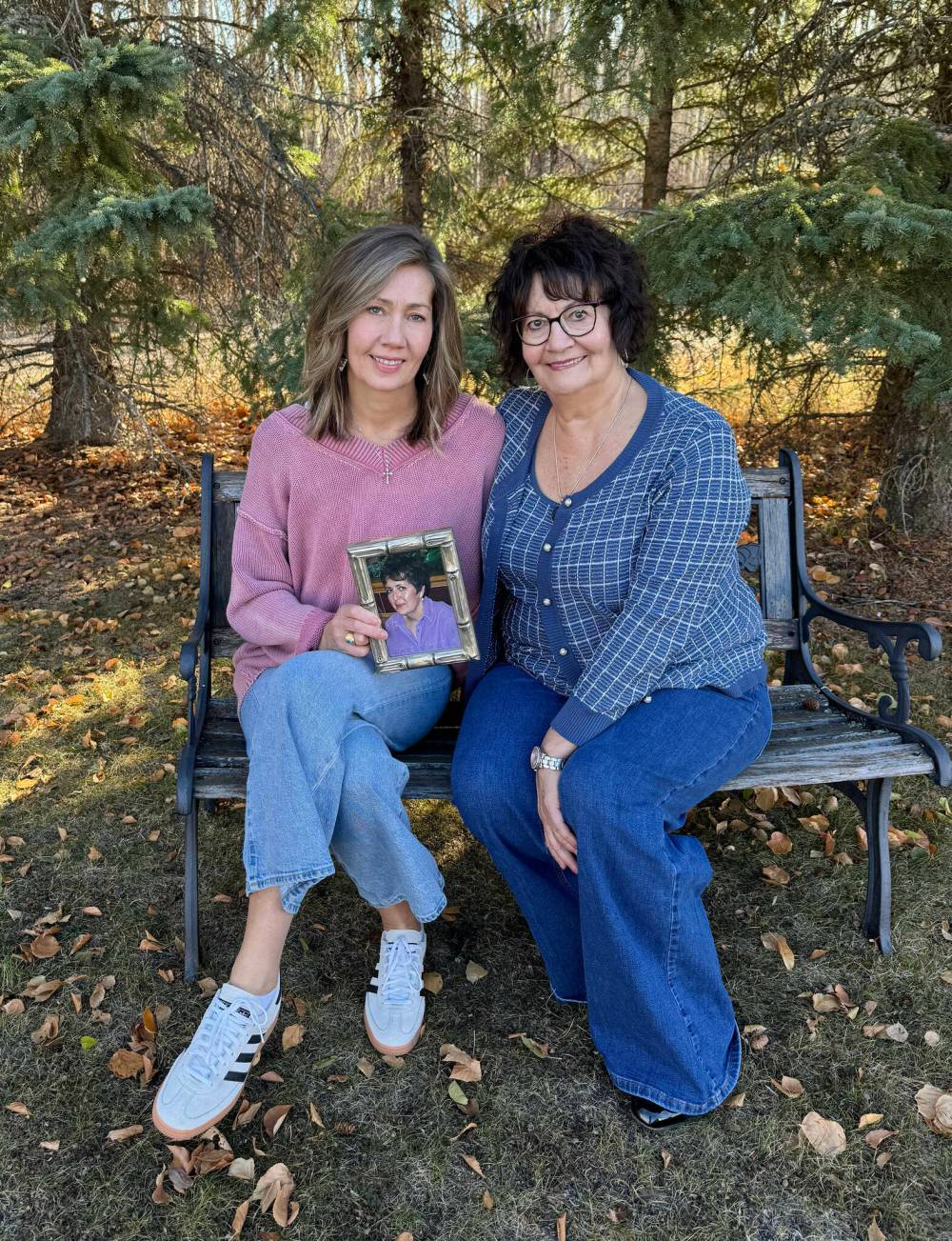25 years later, family still hopes for justice
BEVERLEY ROWBOTHAM CASE
Advertisement
Read this article for free:
or
Already have an account? Log in here »
We need your support!
Local journalism needs your support!
As we navigate through unprecedented times, our journalists are working harder than ever to bring you the latest local updates to keep you safe and informed.
Now, more than ever, we need your support.
Starting at $15.99 plus taxes every four weeks you can access your Brandon Sun online and full access to all content as it appears on our website.
Subscribe Nowor call circulation directly at (204) 727-0527.
Your pledge helps to ensure we provide the news that matters most to your community!
To continue reading, please subscribe:
Add Brandon Sun access to your Free Press subscription for only an additional
$1 for the first 4 weeks*
*Your next subscription payment will increase by $1.00 and you will be charged $20.00 plus GST for four weeks. After four weeks, your payment will increase to $24.00 plus GST every four weeks.
Read unlimited articles for free today:
or
Already have an account? Log in here »
WINNIPEG — Beverley Rowbotham’s last surviving sibling will light a candle tonight, a sombre ritual every Oct. 24, when fond memories intertwine with anguish over her horrific slaying 25 years ago.
Barb Kilpatrick hasn’t lost hope that new information will emerge, or something will happen in her lifetime, to bring closure and justice for her sister.
KILLED IN HER BACKYARD

Beverley Rowbotham’s niece, Melanie Larocque (left) and sister, Barb Kilpatrick, have not lost hope that one day there will be justice and closure for their loved one, who was found murdered in Selkirk on Oct. 25, 2000. (Natalie Larsen)
“Bev has been dead for 25 years. That’s a very long time, and all the things she’s missed, all the family things — her boys growing up, all the new nephews and nieces — we’re just feeling really sad,” Kilpatrick, 76, told the Winnipeg Free Press. “I hold on to hope. Hope is everything.”
Rowbotham, 42, was killed in her family’s backyard in the RM of St. Andrews, police concluded, in one of Manitoba’s highest-profile homicides in recent memory.
Nearly eight years passed before RCMP charged a suspect — her husband, Mark Stobbe. The former Manitoba government adviser denied killing her and was acquitted of second-degree murder in March 2012. No one has been charged or tried since then.
Prosecutors claimed Stobbe hit Rowbotham 16 times in the head with a hatchet following an argument, and then moved her body and cleaned up the scene, while their children slept inside their home.
His defence lawyer accused police of having “tunnel vision” focused on the wrong person, and suggested Rowbotham was killed by a stranger who had tried to rob her.
RCMP found Rowbotham’s body in the back seat of her Ford Crown Victoria in Selkirk around 4 a.m. on Oct. 25, 2000, about 90 minutes after Stobbe reported her missing. The car was next to a service station, some 15 kilometres from the couple’s home on River Road.
Rowbotham’s two sisters decided to light candles in her memory every Oct. 24 because RCMP believed she was killed on that date.
This year’s remembrance has an additional layer of sadness for Kilpatrick. She is also mourning her sister Betty Rowbotham, 79, who died Oct. 18. A funeral will be held 25 years to the day the pair learned Beverley was dead.
“(Betty) would have liked to have seen justice for Beverley. As the years went by and nothing happened, she wanted it just so bad,” Kilpatrick said from her home in Rocky Mountain House, Alta.
While the RCMP investigation is inactive, Kilpatrick and her daughter, Melanie Larocque, said it’s possible key information could still be shared with investigators.
They are trying to find a man and woman who they said left a mysterious note for Kilpatrick, who was a nurse at a hospital in Rocky Mountain House in March 2018, when she happened to be away on vacation.
Kilpatrick and Larocque provided a photo of the note, signed by “Paul and Ann” from Calgary, to the Free Press in a bid to identify the couple.
The author claimed “something very horrible” happened to their family in 1999 and 2000, and “circumstances” concerning their family “came into contact” with Rowbotham’s family before her death.
Kilpatrick was told the couple was of retirement age, and the woman had a limp and used a cane.
Larocque, 50, said the couple phoned Kilpatrick’s house number from a blocked line, but no one was home and contact details were not provided in a voice message.
She said the letter was given to RCMP, but “Paul and Ann” were not identified and never got in touch again.
“Come forward. Share what you have,” Kilpatrick pleaded.
Larocque said she has always wondered if the killer will come forward and confess “because they couldn’t live with their guilt.”
Rowbotham would be 67 if she were alive today. Her sister and niece remembered her as a smart, loyal and adventurous woman who went skydiving, taught in Japan and completed two university degrees.
“She was a social worker. She was very passionate about women’s causes,” Kilpatrick said. “Her boys were the light of her life.”
Rowbotham inspired her niece to become a social worker.
“She was a voice for the voiceless. Wherever she was, she was lending a helping hand or being an advocate for the less fortunate,” Larocque said.
PUBLIC CAPTIVATED BY KILLING
Rowbotham was preparing to interview for a job with the provincial government when she died. Stobbe was a communications adviser to the government of Gary Doer.
The slaying happened about five months after the couple and sons Jacob and Nicholas, then three and five, moved to a quiet area just north of Winnipeg from Regina, where Stobbe, then 42, was a top adviser to then-Saskatchewan premier Roy Romanow.
Armed with those details, the media and public were captivated by the homicide. It happened at a time when people were not as connected by technology, or exposed to a deluge of information about crimes around the world, said Frank Cormier, a criminologist at the University of Manitoba.
Social media was not yet a domain for rampant speculation.
“The case really stood out at the time,” Cormier said. “As soon as some details started to come out, the circumstances seemed highly unusual, to say the least. The amount of circumstantial evidence we started hearing about in news reports, everyone was talking about it.”
Early on, Stobbe told police his wife left home around 8:30 p.m. to buy items at a Safeway in Selkirk, after doing a larger shop that afternoon.
He told investigators he fell asleep while getting his youngest son back to bed, and awoke around 2:30 a.m. to find Rowbotham wasn’t at home.
Stobbe phoned his in-laws and RCMP, who immediately considered him a suspect, court records said. Police put him under visual surveillance and tapped his phone.

In this March 29, 2012 photograph, an emotional Mark Stobbe speaks to media before he walks away from the Winnipeg courthouse a free man after a jury acquitted him of second-degree murder in the death of his wife, Beverley Rowbotham. (Ken Gigliotti/Winnipeg Free Press files)
Court documents said Stobbe initially refused to allow a search of the property when officers stopped by on Oct. 26, 2000. He asked them to wait until after his wife’s funeral. RCMP obtained a warrant and began searching the next day.
A second-degree murder count was laid in May 2008, after a B.C. prosecutor reviewed the evidence and recommended the charge. Manitoba sought an out-of-province opinion, given Stobbe’s earlier government job.
Four Alberta prosecutors did not recommend charges during earlier reviews. The evidence was insufficient and there was no reasonable likelihood of conviction, they found.
HUSBAND ACQUITTED AT TRIAL
Opening the trial in January 2012, the Crown acknowledged its case was circumstantial. No eyewitness or direct evidence linked Stobbe to the crime. The murder weapon was never found.
The Crown alleged the couple’s seven-year marriage became strained after the move to Manitoba, leading to a fatal argument. Stobbe told court there were no serious problems in their marriage.
Investigators found Rowbotham’s blood, hair and fragments of her skull in the yard, and a small blood stain on a garage fridge that had mixed DNA from Rowbotham and Stobbe, court heard.
The Crown said blood on a towel and tissues at the home belonged to Stobbe, who told jurors he cut himself shaving.
An unidentified male’s DNA was found on the purse that was with Rowbotham in the car, court heard. Her socks and shoes were not on her feet. She had defensive wounds, court heard.
The Crown alleged Stobbe abandoned the car and returned home on a bicycle that was in the trunk. Witnesses who reported seeing a large man on a bike could not identify him.
Stobbe spent six days on the stand, where he repeatedly denied killing his wife. He cried after telling jurors he was in the house and should have been able to stop the killer.
The seven-week trial heard from around 80 witnesses. Jurors deliberated for three days before returning a not guilty verdict that shocked Rowbotham’s sisters.
SISTER AND NIECE STILL HOLD HOPE
Manitoba RCMP spokeswoman Cpl. Melanie Roussel said this week the investigation is no longer active, but it could potentially be reopened if information relating to a “new” suspect is brought forward.
After the trial, Stobbe returned to Saskatoon, where he lived with his sons, before relocating to Regina. He began writing books, remarried and became a college sociology instructor.
One of his books touched on his time in pre-trial custody. He also wrote about “Mr. Big” stings that undercover police use to gain confessions, and prosecutions of homicides in which victims’ bodies were not found.
Stobbe declined an interview request for this article.
“Anything I say gets interpreted by some people from the worst possible outlook, so I’ve decided to say nothing,” he said.
In 2018, he told the Free Press he believed he was charged because the high-profile nature of the case put pressure on the justice system to come up with a result.
Kilpatrick and Larocque said they do not have any contact with Stobbe, but they remain in touch with sons Jacob and Nicholas.
Kilpatrick and Larocque said they were appalled by the subject matter of Stobbe’s books. They are frustrated by what they described as inaction on his part to help solve his wife’s killing.
“He’s such a brilliant researcher. Maybe he could be researching. It’s sort of like Bev never existed,” Kilpatrick said. “I would think somebody would be wanting things looked into, wanting to find out why, how?”
“You have this man, my uncle, who is writing these books and is teaching criminology at a college level, but yet nothing has been done to pursue any justice for Bev,” Larocque said. “It makes no sense whatsoever.”
When he was acquitted in 2012, Stobbe told reporters he would like to know the killer’s identity but, as a judge pointed out in court, it’s not his job to find out.
Kilpatrick and Larocque continue to speak out, they said, because Rowbotham would not give up on a loved one in similar circumstances.
They were involved in a new “Canadian True Crime” podcast episode, “Remembering Beverley Rowbotham,” that will be released Saturday.
“I wonder if sometimes people think, ‘Oh, it’s been 25 years, just let it rest.’ We’ve always said Bev was a very strong advocate for women and for children,” Larocque said. “If this happened to any one of us, she would be shouting from a rooftop demanding justice and demanding closure.”
» Winnipeg Free Press
